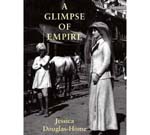Book review: A Glimpse of Empire
Jessica Douglas-Home writes a wonderful memoir evoking memories of empire


To order any of the books reviewed or any other book in print, at
discount prices* and with free p&p to UK addresses, telephone the Country Life Bookshop on Bookshop 0843 060 0023. Or send a cheque/postal order to the Country Life Bookshop, PO Box 60, Helston TR13 0TP * See individual reviews for CL Bookshop price
Memoir A Glimpse of Empire Jessica Douglas-Home (Michael Russell, £17.95)
This book is a classic, and if, given the prevailing Downtonmania, the British public doesn't make it a bestseller, it will have deprived itself of a treat. Lilah Wingfield was a high-spirited Irish girl, brought up in the marmoreal grandeur of Powerscourt Castle so cold that ‘Nanny put her flannel apron on the bed to warm our frozen feet'. Despite the Spartan regime, Powerscourt was heaven, not least because Lilah's parents, whom she barely saw, allowed their young family to run wild. That life came to an end in 1904, when her father died of pneumonia.
The restrictions of polite society in London, her new home, came as a shock, and her previously inattentive mother became demanding. Not caring for any of the men she might have married, she engineered an escape by visiting the 1911 Delhi Durbar, in the company of another young woman and an impeccably harmless older man. She kept a journal of all that she did and saw, and it is the basis of this book.
First, the party had to get there, risking, in Lilah's case, the attentions of the Comte de Madre, a ‘funny old Frenchman' on the prowl for a suitable young wife, but being more intrigued by the 13-year-old Maharaja of Jodhpur and his guardian. After a fortnight at sea, they spent another two days on a train, before arriving at the Tented City. City was not too strong a word, as it housed 250,000 people, but tent hardly suggests the luxury amid which some of the 475-odd Indian princes lived.
The anticlimax of the Emperor King's entry to Delhi, sitting on a small, bay horse, specially chosen for its docility, was ‘rather a pity', but otherwise, the ‘mass of colour' presented by the British troops, all glittering spear points and dancing pennons, made ‘a wonderful, really wonderful sight'. That, however, was nothing to the glamour of the maharajahs: ‘The jewels worn by the occupants of the coaches were a thing to dream of-great ropes of pearls and emeralds as large as pigeon eggs such as I have never seen before and so strange to see them adorning men.'
Sign up for the Country Life Newsletter
Exquisite houses, the beauty of Nature, and how to get the most from your life, straight to your inbox.
Lilah loved every moment, and if she didn't witness the 21-year-old, cricket-playing Maharaja of Patiala wearing only a diamond-encrusted breastplate (although the family tradition whereby ruling maharajahs showed themselves to their people in a state of sacred erection had been discontinued, he was practising to emulate his forebears), she enjoyed the superb horsemanship shown by her young friend the Maharaja of Jodphur, who mastered a difficult steed as he saluted, before ‘charging off like lightning to a roar of applause from the crowd'.
George V may not have been an imaginative man, but he had an enlightened view of the princes, never allowing the word ‘native' to be uttered in his presence. Others may have panicked when a neighbouring tent caught fire during dinner, but he and Queen Mary kept their seats. Lilah managed to get home without becoming the Maharaja of Jaipur's sixth wife or 19th concubine, nor even, despite encountering Annie Besant on the ship home, a Theosophist. At home, she soon married the MP Clive Morrison-Bell. Children and grandchildren came, one of them being the author. She never returned to India, but we can through this enchanting book.
* Give
Country Life for Christmas and save up to 40%
Country Life is unlike any other magazine: the only glossy weekly on the newsstand and the only magazine that has been guest-edited by HRH The King not once, but twice. It is a celebration of modern rural life and all its diverse joys and pleasures — that was first published in Queen Victoria's Diamond Jubilee year. Our eclectic mixture of witty and informative content — from the most up-to-date property news and commentary and a coveted glimpse inside some of the UK's best houses and gardens, to gardening, the arts and interior design, written by experts in their field — still cannot be found in print or online, anywhere else.
-
 About time: The fastest and slowest moving housing markets revealed
About time: The fastest and slowest moving housing markets revealedNew research by Zoopla has shown where it's easy to sell and where it will take quite a while to find a buyer.
By Annabel Dixon
-
 Betty is the first dog to scale all of Scotland’s hundreds of mountains and hills
Betty is the first dog to scale all of Scotland’s hundreds of mountains and hillsFewer than 100 people have ever completed Betty's ‘full house’ of Scottish summits — and she was fuelled by more than 800 hard boiled eggs.
By Annunciata Elwes